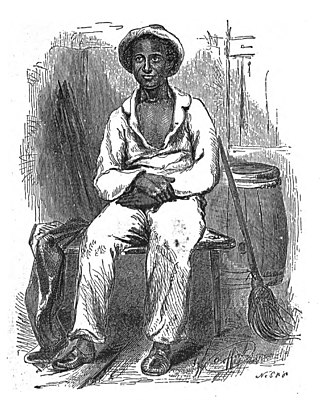
Solomon Northup was an American abolitionist and the primary author of the memoir Twelve Years a Slave. A free-born African American from New York, he was the son of a freed slave and a free woman of color. Northup was a professional violinist, farmer, and landowner in Washington County, New York. In 1841, he was offered a traveling musician's job and went to Washington, D.C. ; there, he was drugged and kidnapped into slavery. He was shipped to New Orleans, purchased by a planter, and held as a slave for 12 years in the Red River region of Louisiana, mostly in Avoyelles Parish. He remained enslaved until he met Samuel Bass, a Canadian working on his plantation who helped get word to New York, where state law provided aid to free New York citizens who had been kidnapped and sold into slavery. His family and friends enlisted the aid of the Governor of New York, Washington Hunt, and Northup regained his freedom on January 3, 1853.

David Murray "Dav" Pilkey Jr. is an American cartoonist, author, and illustrator of children's literature. He is best known as the author and illustrator of the children's book series, Captain Underpants, and its spin-off children's graphic novel series Dog Man, the latter published under the respective writer and illustrator pen names of George Beard and Harold Hutchins, which are also the names of the two protagonists of the Captain Underpants series.
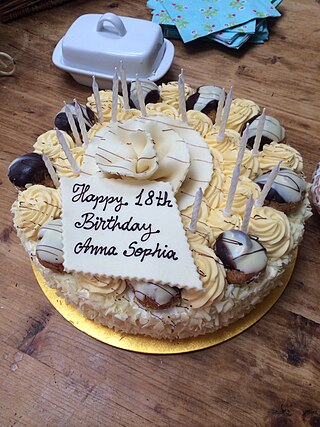
A birthday cake is a cake eaten as part of a birthday celebration. While there is no standard for birthday cakes, they are typically highly decorated layer cakes covered in frosting, often featuring birthday wishes and the celebrant's name. In many cultures, it is also customary to serve the birthday cake with small lit candles on top, especially in the case of a child's birthday. Variations include cupcakes, cake pops, pastries, and tarts.

Raina Telgemeier is an American cartoonist. Her works include the autobiographical webcomic Smile, which was published as a full-color middle grade graphic novel in February 2010, and the follow-up Sisters and the fiction graphic novel Drama, all of which have been on The New York Times Best Seller lists. She has also written and illustrated the graphic novels Ghosts and Guts as well as four graphic novels adapted from The Baby-Sitters Club stories by Ann M. Martin.

The National Coalition Against Censorship (NCAC), founded in 1974, is an alliance of 50 American non-profit organizations, including literary, artistic, religious, educational, professional, labor, and civil liberties groups. NCAC is a New York–based organization with official 501(c)(3) status in the United States. The coalition seeks to defend freedom of thought, inquiry, and expression from censorship and threats of censorship through education and outreach, and direct advocacy. NCAC assists individuals, community groups, and institutions with strategies and resources for resisting censorship and creating a climate hospitable to free expression. It also encourages the publicizing of cases of censorship and has a place to report instances of censorship on the organization's website. Their annual fundraiser is called the Free Speech Defender Awards. The main goal of the organization is to defend the first amendment, freedom of thought, inquiry, and expression. NCAC's website contains reports of censorship incidents, analysis and discussion of free expression issues, a database of legal cases in the arts, an archive of NCAC's quarterly newsletter, a blog, and Censorpedia, a crowdsourced wiki. In fiscal year 2017, the organization earned a 95.93% rating by Charity Navigator, an organization that assesses the efficacy of nonprofits.
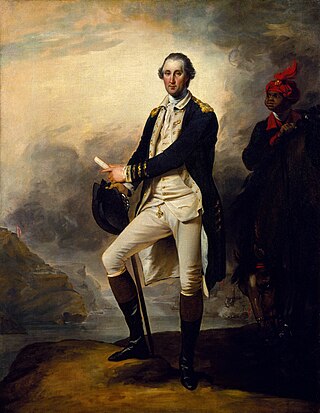
The history of George Washington and slavery reflects Washington's changing attitude toward the ownership of human beings. The preeminent Founding Father of the United States and a hereditary slaveowner, Washington became increasingly uneasy with it. Slavery was then a longstanding institution dating back over a century in Virginia where he lived; it was also longstanding in other American colonies and in world history. Washington's will immediately freed one of his slaves, and required his remaining 123 slaves to serve his wife and be freed no later than her death, so they ultimately became free one year after his own death.
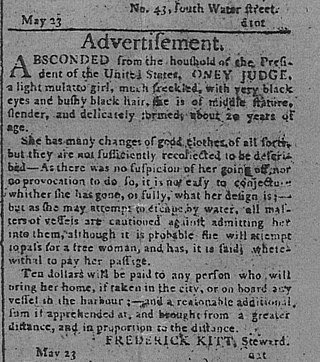
Ona "Oney" Judge Staines was a slave owned by the Washington family, first at the family's plantation at Mount Vernon and later, after George Washington became president, at the President's House in Philadelphia, then the nation's capital city. In her early twenties, Judge absconded, becoming a fugitive slave, after learning that Martha Washington had intended to transfer her ownership to her granddaughter, known to have a horrible temper. Judge fled to New Hampshire, where she married, had children, and converted to Christianity. Though Judge was never formally freed, the Washington family ultimately stopped pressing her to return to enslavement in Virginia after George Washington's death.
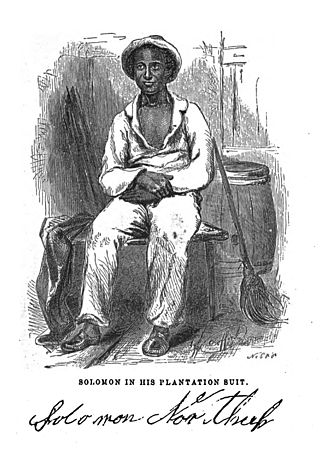
Twelve Years a Slave is an 1853 memoir and slave narrative by Solomon Northup as told to and written by David Wilson. Northup, a black man who was born free in New York state, details himself being tricked to go to Washington, D.C., where he was kidnapped and sold into slavery in the Deep South. He was in bondage for 12 years in Louisiana before he was able to secretly get information to friends and family in New York, who in turn secured his release with the aid of the state. Northup's account provides extensive details on the slave markets in Washington, D.C., and New Orleans, and describes at length cotton and sugar cultivation and slave treatment on major plantations in Louisiana.
Hercules Posey was a slave owned by George Washington, at his plantation Mount Vernon in Virginia. "Uncle Harkless," as he was called by George Washington Parke Custis, served as chief cook at the Mansion House for many years. In November 1790, Hercules was one of eight enslaved Africans brought by President Washington to Philadelphia, Pennsylvania, then the temporary national capital, to serve in the household of the third presidential mansion.

The President's House in Philadelphia was the third U.S. Presidential Mansion. George Washington occupied it from November 27, 1790, to March 10, 1797, and John Adams occupied it from March 21, 1797, to May 30, 1800.

Ramin Ganeshram is an American journalist and culinary historian. She is known for her work in polycultural American history and historic foodways.
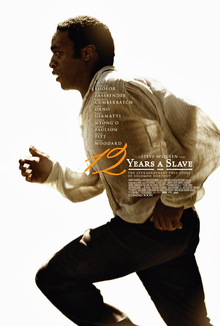
12 Years a Slave is a 2013 biographical drama film directed by Steve McQueen from a screenplay by John Ridley, based on the 1853 slave memoir Twelve Years a Slave by Solomon Northup, an African American man who was kidnapped in Washington, D.C. by two conmen in 1841 and sold into slavery. He was put to work on plantations in the state of Louisiana for 12 years before being released. The first scholarly edition of David Wilson's version of Northup's story was co-edited in 1968 by Sue Eakin and Joseph Logsdon.
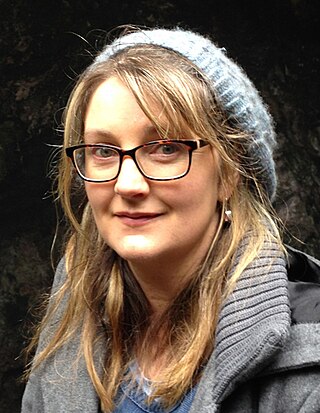
Ruth Paul is a children's picture book author and illustrator from Wellington, New Zealand.
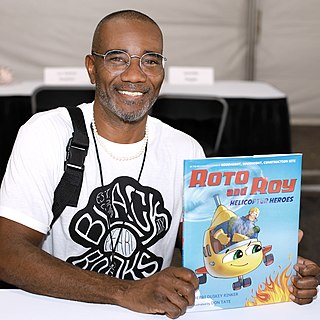
Don Tate is an American author and illustrator of books for children. Tate creates both fiction and nonfiction picture books, with a focus on the biographies of little-known historical figures. He is also a strong advocate for more literature that reflects and honors the lives of all young people. He notes that as a child he had to read the encyclopedia to discover a multicultural world; based on the children's books of his day he "thought the world was white". He co-founded the Brown Bookshelf, a blog designed to push the awareness of African Americans writing and illustrating books for young people. Tate also assisted in the #WeNeedDiverseBooks campaign to help put more books featuring diverse characters into the hands of readers.
Hercules Mulligan was an Irish-American tailor and spy during the American Revolutionary War. He was a member of the Sons of Liberty.
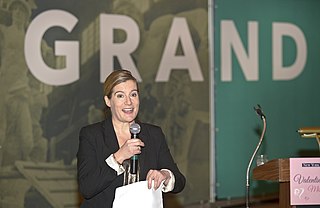
Sophie Jocasta Blackall is an Australian artist, author, and illustrator of children's books based in Brooklyn, New York.
Leslie MacFadyen, known professionally as Leslie Mac, is an American activist and community organizer. She is a co-founder of the Ferguson Response Network, the co-creator of the Safety Pin Box monthly subscription service, and has created multiple digital campaigns such as #PayBlackWomen and #SlaveryWithASmile.

Maurice Richard Robinson Jr. was an American business executive and educator. From 1975 until his death in 2021, Robinson was the chief executive officer of Scholastic Corporation. Robinson was noted for bringing many book franchises to younger readers, such as Harry Potter and Captain Underpants.















